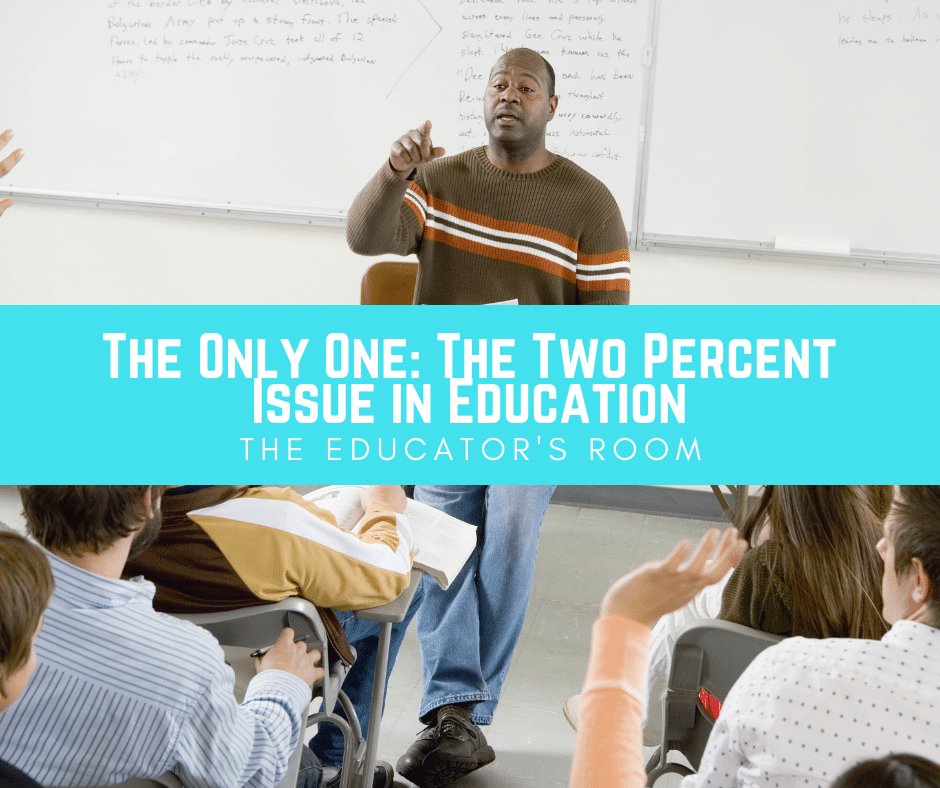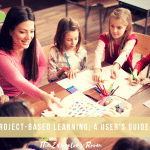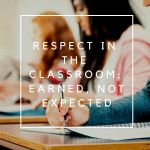I grew up abroad. In elementary school, I was often the only Black male in my class. Even though there were probably racist conversations had around me, I was oblivious. I was aware I was different from most in my class, but my family instilled pride and confidence in me at a young age. However, pride and confidence shouldn’t have to repel racism.
With only two percent of educators being Black males, it’s an understatement to say we’re a minority. What does it feel like when you’re the only black male in the building? How does your actions shape the views and opinions of others around you, about you, about your race? If you’re a black male in the field of education, there’s a high likelihood that you’ve been in the unenviable position of being “the only one.”
It can feel like you’re the resident expert on all things related to Black culture mainly because you are the Black male representative. Somehow, you are consulted for most disciplinary issues in the building. Whenever there is a child with a behavior issue (regardless of grade level), you are labeled the biggest, baddest, scariest person in the building that all students should fear.
There are other times when you’re over it because your non-Black colleagues want to know if we, all Black people, raise children in a certain fashion, as if Black people are a monolith. Some questions are based in true naiveté while others are much more troll-worthy, like “Are Black lives supposed to matter more or something?” or “Don’t you think it’s disrespectful and ungrateful to our country when those players kneel whenever the American anthem is being sung?” More recently it’s been, “Do you still listen to R. Kelly’s music?” or “What do you think made him do those things?” Now, I’m suddenly the spokesperson for R. Kelly, seemingly because I’m a Black male. It can be unnerving.
Of course, you want to let them know how condescending and racist it all sounds but you don’t want it to take a left turn. Left turns result in HR complaints, pariah-status, missed raises, missed promotions, poor evaluations, and possible job loss if you go too hard in the paint. So, how can we balance it all? You know, being the savior, not just the disciplinarian, for all Black students in your building (not because the students see you as such but because the predominantly white faculty & staff believe that’s part of your job title), be the resident expert on all things Black, ward-off bigotry, xenophobia and overt racism like Off bug spray, and still maintain your sanity? Simple answer, you can’t. Unless you are Christ incarnate.
The subtleties become even more piercing, once you’re confronted with that first blatantly racist comment, “Well, you know that student’s mom and dad don’t live together; I figured she’s a single mom. I think his dad is in jail or something.” You really want to go off on them, but you know what’s at stake. There’s only so much you can do. In reality, when you are a Black male educator in a predominantly white school, remaining professional can feel like selling out. Now how can you keep your job without blowing a gasket? Glad you asked. Here are three ways to confront potentially racist situations and still maintain employment:
- The Passive Aggressive Approach: Of the three approaches, this is recommended least. It’s indirect and can send an unclear message. This can often look like a teacher badmouthing a student/parent’s last name or accent. You hear it, simply stop what you’re doing, and walk away. That accomplishes nothing; it could symbolize your disapproval of commentary or something else. The “something else” does not address the racist remarks.
- The Direct Approach: Ask the colleague in question to repeat what they just said. This achieves two goals. First, it gives you time to listen to make sure you heard them correctly and compose yourself. Second, it gives your colleague the opportunity to clean up his or her commentary and informs him or her that you’re not someone who will let their racism, xenophobia, and/or bigotry go unchecked.
- The Anonymous Tipster Approach: In most neighborhoods, there is an expression, “Snitches get stitches.” That phrase does not ring true when confronting racism and bigotry. In every HR video known to mankind, you are encouraged to report the aforementioned behavior anonymously. Besides, this puts the colleague in a vulnerable position. He or she does not know who told and will govern themselves at all times, moving forward.
James Baldwin once said, “To be Black and conscious in America is to be in a constant state of rage.” Between the microaggressions and blatant racism, you have a job to do and students that depend on you. Black males are grossly underrepresented in the field of education; however, somewhere in your school there is a young man or young woman that is looking up to you, for whom you serve as an unofficial mentor. When you are confronted with racism, bigotry or xenophobia, address it.
[bctt tweet=”James Baldwin once said, “To be Black and conscious in America is to be in a constant state of rage.” ” username=””]






